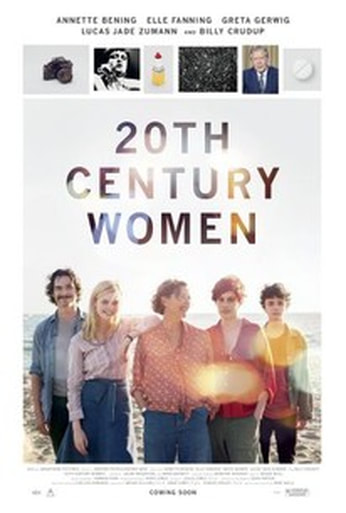Film Reviews20th century women: it takes an (over deterministic) villageJun 28, 2017 Anchorage Press
|
|

The title of the film, 20th Century Women directed and written by Mike Mills is promising indeed. After all, it’s a big title. It could be about any of the amazing women of the 20th century, women of any ethnicity, in any field, or in any circumstance. The 20th century is teeming with historic, social and political material so the title leads one to believe that the contents of the two-hour film is going speak to the state of women in across a century. It’s disappointing then that the title and the contents have little to do with one another. It’s as if the title was picked out of a hat, or one has to really extrapolate the social commentary from a sliver of events and then apply it uniformly to 20th century women. That isn’t to say that the story presented is without merit, but it’s overdetermined and seen through the white, male, (perhaps straight) gaze, which frankly, is getting old.
The film takes place in southern California in 1979 but it lacks the texture of the times. Whatever references there are to women’s lib and the cultural and political shifts are secondary and watered down. 20th Century Women is about Dorothea Fields, played by Annette Bening, who had a son late in life. Dorothea is a single mom living in a big house, which affords her the option of taking in boarders to help make ends meet. At the age of 55 she finds that she may not be able to meet the challenges that come with raising the budding teenager, Jamie (Lucas Jade Zumann), so Dorothea solicits the help of Jamie’s best friend Julie (Elle Fanning) and Abbie (Greta Gerwig) to help Jamie grow in the right direction. William, (Billy Crudup) is another boarder and he too joins in collective parenting. The story in the film is solidly focused on the interactions within the quintet, giving everyone a turn and an almost-equal voice. The cast is great and each one delivers a compelling performance, the problem is with the script—it’s so tight that it suffocates; it’s so over determined that it leaves no room for magic or the power of happenstance.
The narrative is fully under the director’s control, but in this case this isn’t a good thing because he controls the past, present, and future, thus the character development is linear and banal. The narrative is slow and predictable, making a good portion of the movie boring. However, about a third of the way in, the story hits its stride and the pace picks up, making this portion of the film meaningful and more than tolerable. When the film is at its best, the stars shine. Unfortunately, this portion does wind down and then it’s back to a snail’s pace. For the most part the film delivers continuity throughout, except when it doesn’t, and that’s just annoying.
The writer-director sabotages his own success by giving it all away without the viewer asking to know. In his effort to tie up loose ends he gives the characters a present and a future voice, making them active participants and also omniscient narrators, and this takes away from any possibilities they may have in the future. Perhaps the most disappointing part of knowing how everything turns out is that in the end it’s a beige and heteronormative future for all.
Showing on Monday July 3 2017 5:30 PM (118 Minutes)
The film takes place in southern California in 1979 but it lacks the texture of the times. Whatever references there are to women’s lib and the cultural and political shifts are secondary and watered down. 20th Century Women is about Dorothea Fields, played by Annette Bening, who had a son late in life. Dorothea is a single mom living in a big house, which affords her the option of taking in boarders to help make ends meet. At the age of 55 she finds that she may not be able to meet the challenges that come with raising the budding teenager, Jamie (Lucas Jade Zumann), so Dorothea solicits the help of Jamie’s best friend Julie (Elle Fanning) and Abbie (Greta Gerwig) to help Jamie grow in the right direction. William, (Billy Crudup) is another boarder and he too joins in collective parenting. The story in the film is solidly focused on the interactions within the quintet, giving everyone a turn and an almost-equal voice. The cast is great and each one delivers a compelling performance, the problem is with the script—it’s so tight that it suffocates; it’s so over determined that it leaves no room for magic or the power of happenstance.
The narrative is fully under the director’s control, but in this case this isn’t a good thing because he controls the past, present, and future, thus the character development is linear and banal. The narrative is slow and predictable, making a good portion of the movie boring. However, about a third of the way in, the story hits its stride and the pace picks up, making this portion of the film meaningful and more than tolerable. When the film is at its best, the stars shine. Unfortunately, this portion does wind down and then it’s back to a snail’s pace. For the most part the film delivers continuity throughout, except when it doesn’t, and that’s just annoying.
The writer-director sabotages his own success by giving it all away without the viewer asking to know. In his effort to tie up loose ends he gives the characters a present and a future voice, making them active participants and also omniscient narrators, and this takes away from any possibilities they may have in the future. Perhaps the most disappointing part of knowing how everything turns out is that in the end it’s a beige and heteronormative future for all.
Showing on Monday July 3 2017 5:30 PM (118 Minutes)